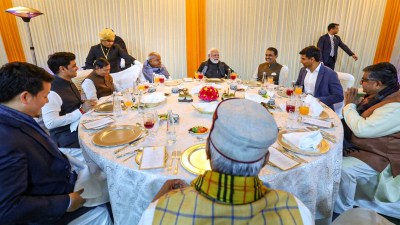
But what’s always fascinating, at least for the first two acts of this three-act story, is how difficult it is to put Jagruti into a box. This is kryptonite for Hindi cinema, an industry that, as much as it likes to throw around words like ‘grey shades’ and ‘flawed characters’, shivers at the suggestion of not having clearly defined heroes and villains.
Jagruti is a largely absent parent who regularly cancels on her child to follow leads and sniff out sources for purely selfish reasons; her motivations aren’t altruistic. And that’s because she’s career hustler, someone who has risen to the top of her field with a cutthroat clarity about the challenges that she, as a woman, could face. “No one can reign her in, she says it like it is,” her editor, the inspirational Imran (played by series standout Mohammed Zeeshan Ayyub) says about her in one scene. Jagruti has a transactional relationship with a supremely well-hydrated but just as sketchy senior police officer, played by Harman Baweja, and a bit of a reputation among her colleagues.
Her rivals, both men and women, assume that she has slept her way to the top, an impression no doubt solidified by the overt moves that Baweja’s cop makes on her (no one questions his creepiness, by the way). And her co-workers are wary of her ruthless methods. “J fights full-on, woh chhodegi nahi, na source ko na poacher ko,” one of them tells another about how fiercely protective Jagruti is of her contacts. But she isn’t above poaching sources herself. “Touquir is my guy, stay away from him,” she warns in one scene. Nor is she above being cocky and arrogant at the workplace. “These scented candles won’t help you smell an actual story,” she says as a manner of greeting to one of her colleagues. Jagruti doesn’t realise it, but she doesn’t have too many friends in the industry, and this will come to bite her in the butt when she needs their support.
Not that being on good terms with everybody would’ve guaranteed her assistance when she is arrested for having a hand in the murder of a rival crime reporter. In fact, Scoop highlights just how cold the journalism industry really is. Populated by hustlers and sycophants, it’s an unforgiving world, where rumour spreads faster than a corpse’s blood on a pavement. It isn’t uncommon for people to constantly be wrangling for power by putting their money on the right horses, or for them to suddenly find themselves reporting to people who were once their underlings. There are mini Successions unfolding in newsrooms across the country on a daily basis.
Scoop isn’t a subtle show, but one moment quietly captures how fluidly power can change hands in the world of journalism. It’s when Imran asks for a private meeting with his boss, Brij, to tell him that he cannot undermine his authority by making editorial decisions on his behalf, and Brij beckons for Imran’s subordinate to join in. Imran gets the hint, as does his subordinate. It’s Imran’s job to lose, and the subordinate’s to scoop up.
Story continues below this ad
But these harsh truths about human nature aren’t, of course, restricted to one field. Unlike most other professions, however, there is a sense of honour and social responsibility attached to journalism that you won’t find in, say, accounting. This is a realisation that Jagruti has after her humbling experience in jail. She discovers that she used to take things for granted — her family, her child, the power of the pen — and vows to do better. But the show has a holier-than-thou attitude in these later episodes, and sort of suggests that Jagruti had it coming, even though worse people than her have deluded themselves into thinking that they are safe, that the masters they serve and the corporations they protect won’t throw them under the bus at the first opportunity.
This is odd, because Scoop had (admirably) avoided passing judgement about Jagruti thus far, and for it to turn into a morality tale towards the end sort of undermines its earlier stance. It’s also a bit rich of the show to grandstand about ethics, considering a certain creative decision in the final episode. If liberties were going to be taken, as they have been, then was it really impossible to avoid showing the Pragya Thakur stand-in as a saffron saviour type figure? Because as things stand, this character is presented in the show entirely without context, and anyone in the world could’ve served her purpose. But it was a deliberate decision to project the person who ‘rescued’ Jagruti as a sadhvi. Mehta’s last film, Faraaz, had a similar appeasement issue.
But unlike that film, Scoop is a more character-driven piece; it has more in common with Mehta’s earlier gems, Aligarh and Shahid. That being said, there’s a sense that it would’ve worked better as a movie, without all the deep background material being made the lede.
Post Credits Scene is a column in which we dissect new releases every week, with particular focus on context, craft, and characters. Because there’s always something to fixate about once the dust has settled.




































